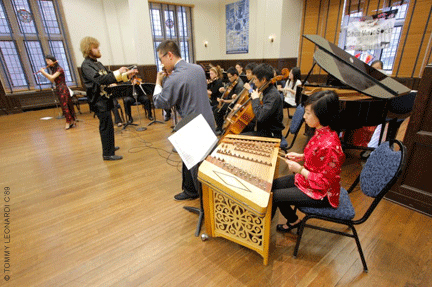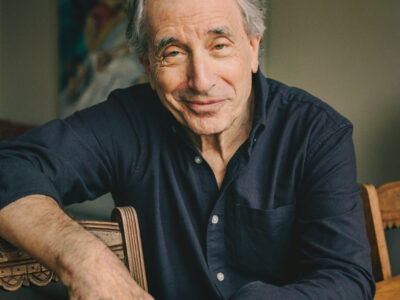
A musical polymath brings out the best in Penn’s Chinese Musical Society.
By Karen Rile
Ted Cheek C’11 taps his baton. With his ginger beard and tousled strawberry-blond hair, he looks as if he would be more at home shouldering a set of bagpipes or an Irish fiddle than conducting the Chinese Musical Society. But as he prepares to open the CMS’s concert in Houston Hall’s Bodek Lounge, his customary conducting regalia—black silk pajamas embroidered with golden dragons—sound a distinctly Chinese note. He describes the outfit as “Eschenbach, but garish,” a playful nod to the former music director of the Philadelphia Orchestra.
Cheek is the music director of the CMS, whose concert this evening features a mélange of modern and Western strings and winds, and an assortment of Western and traditional Chinese instruments—including a yangqin (hammered dulcimer), guzheng (plucked zither), and dizi (bamboo transverse flute). The program includes arrangements of Chinese classical and pop music, movie and video-game music, and even some K-Pop (Korean pop music)—all transcribed, orchestrated, and conducted by Cheek.
“My goal,” he explains later, “is to make the material accessible for both the musicians and the audience.”
He’s well equipped to do so. Having mastered instruments from an array of cultures, timelines, and traditions, Cheek performs as a violinist with the Penn Orchestra and as a lutenist with the Penn Baroque Ensemble, and studies conducting privately with Jonathan Coopersmith at the Curtis Institute. Currently, he harbors 13 instruments in his dorm room at the Quad, including a gut-strung Baroque violin from 1640, a viola, a full-sized archlute (taller than a person), and a large assortment of Chinese instruments purchased and carried home during a summer visit to China.
Tonight’s CMS concert opens with Cheek’s transcription of The Butterfly Lovers, which aptly utilizes the eight-member string section of his small chamber orchestra (for which he has pulled in a couple of ringers—including his sister, violinist Elizabeth Cheek C’13, who serves as concertmaster). His arrangement of contemporary New Age composer Lin Hai’s Happiness creates a jazzy pizzicato counterpoint between the ensemble’s Western and Chinese instruments, with solos by CMS co-president Rosa Chen C’13 and Tianpu Zhang W’13 on dizi and Bernice Kong C’13 on yangqin. The string quartet Sui Generis, comprised of a core group of CMS orchestra members, presents a well-blended, unified sound in Cheek’s arrangement of the K-Pop hit Wedding Dress, with impressive solos by cellist Jeffrey Ho C’11. The concert’s centerpiece is Cheek’s four-movement arrangement of Ip Man, Kenji Kawai’s score for the eponymous 2008 Japanese kung-fu biopic.
By evening’s end, Cheek is pulling a consistently lush sound from the small group, which performs with obvious enjoyment. As heartfelt applause washes over the musicians, they emit a palpable sense of relief. The program, pulled off at a busy time during the academic year, posed an ambitious challenge for the ensemble—not to mention its composer and music director, who created most of the complex arrangements by ear using Chinese YouTube videos as source materials.
The CMS prides itself on operating as a well-oiled machine, which means monthly board meetings and clearly delineated leadership positions among its members. By the time tonight’s concert in Bodek Lounge began, everything was in place, down to the most minute detail of the reception table, which was festooned with bright origami flowers and laden with dim sum treats. Board members sold tickets (15 percent of profits went to relief efforts in Japan) and distributed cherry-blossom-pink playbills for what was clearly one of the best orchestrated student-run events of the season.
Until recently, the musical aspect of the group was almost an afterthought for the CMS executive board, which has been comprised of enterprising business and engineering majors. Now, under Cheek, the society is making itself known as a serious musical entity—a felicitous marriage of art and arts management. The 2010-11 season saw concerts at the Kimmel Center, the Fisher Fine Arts Library, the Arthur Ross Gallery, retirement homes, and numerous Chinese cultural groups.
Cheek has never shied from a musical challenge. He began Suzuki violin lessons as a toddler and could read musical notation before he could read letters. His father—Theodore Cheek, director of obstetric anesthesia at Penn’s Perelman School of Medicine, a self-taught gamba player and a baroque-music zealot—accompanied Ted Jr.’s preschool violin performances on harpsichord and took him to early-music workshops throughout his childhood. Cheek learned the principles of conducting from his mother, Patricia, a French Horn player and vocalist, and tried out his baton guest-conducting with the Germantown Friends orchestra, for which he served as concertmaster during high school.
Cheek arrived at Penn without any particular affinity for Chinese culture, though he already had a strong interest in ancient cultures, languages, and music (he was admitted to Penn’s early-music program as a lute major). A self-described dead-languages and ancient-history fiend, he often dreams in Latin, keeps Horace at his bedside, and has translated the Odyssey—twice. When he met some Chinese students through the Penn Orchestra during his freshman year, it seemed only natural for him to join the CMS as a violinist, learn to speak Chinese, and play Chinese instruments. The Chinese student community has embraced his efforts to revive and direct the music society, often referring to him as “honorary Chinese.”
Having spent the past summer at the Bard Conservatory Conductors Institute, Cheek has returned to Penn, where he will graduate in December with degrees in music and Classics. The following fall he’ll begin graduate studies in conducting, which grew out of his experiences as music director of the CMS. When Cheek took over that role in 2010, his fascination with the art of conducting quickly blossomed—an unexpected, life-changing experience.
“It caught me by surprise,” he says, “but conducting turns out to encapsulate everything I love to do with music: analyzing, directing, helping to create a better sound.” A competitive Taekwondo player, Cheek competes on the Penn team, finding that the study of each discipline informs the other. “When I conduct in two [beats per measure], my instructor says that my beat doesn’t go high enough; in Taekwondo, my instructor complains that I chamber too low,” he explains. “There is a kind of pacing and choreography to the martial art that carries over directly to my conducting: in both disciplines, it’s all about how you communicate energy to others.”
Karen Rile C’80, a frequent contributor to the Gazette, teaches writing at Penn.




